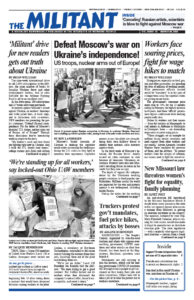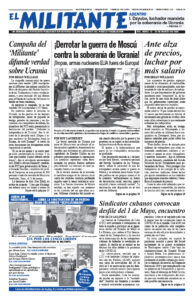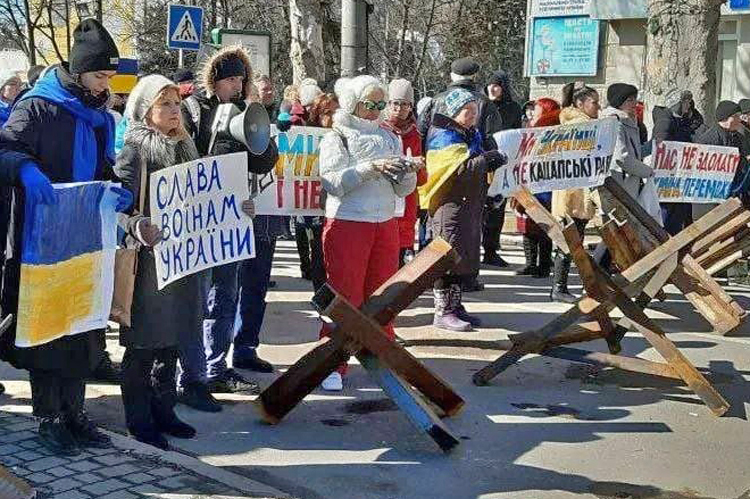Moscow’s brutal invasion of Ukraine is shaking the capitalist world order, increasing the challenges facing the U.S. rulers as they fight to maintain their supremacy. Capitalist powers across the globe are strengthening their own military forces to defend their national class interests against rivals.
In the third week of Moscow’s invasion, the Russian forces’ deadly assault on cities continues to slow because of tenacious Ukrainian resistance. Protests have also met Moscow’s invading forces in towns in the south that they now occupy.
The depth of support for independence by the Ukrainian working people continues to feed popular mobilizations. Millions across the world are impacted by the war and protests against it are widespread, including inside Russia.
Noting the stakes for the working class, a March 3 statement by Socialist Workers Party National Secretary Jack Barnes points to the need for working people to act against Moscow’s war and to orient toward taking political power into our own hands or we “face a future of social devastation, reaction, world war and even nuclear catastrophe.” The statement is available on the Militant website.
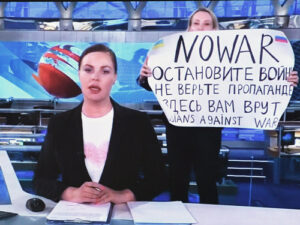
For decades the U.S. rulers acted on the illusion they had won the Cold War after the Soviet Union imploded. They waged wars in Iraq and Afghanistan, expanded membership of their NATO alliance into countries that were formerly part of the Soviet bloc, and waged a devastating war on the people of Yugoslavia, dismembering that state. Doing so, they believed, would extend their role as the dominant power in Europe and ensure their world supremacy.
But the massive industrialization of China has led to the rise of Beijing as an increasingly powerful rival to the U.S. rulers for markets and political influence. The Chinese rulers are expanding their military. Alongside this, the Vladimir Putin regime is asserting itself, intervening in Georgia in 2008, Crimea in 2014 and Ukraine today. The old principal powers in Europe — London and Paris — continue to look for ways to defend their declining place in the world order.
Washington has found no clear course to meet these challenges. Nobody won the Cold War.
The largest land war in Europe since the Second World War is also shattering illusions held by Berlin and other capitalist powers across the continent that they could let their own militaries decline because of the presence of U.S. forces under the NATO flag, and because the European Union would overcome national antagonisms and ensure peace and prosperity.
A top German general, Alfons Mais, bemoaned the fact Feb. 24 that when he woke up to “war in Europe” he realized that the German army “is more or less bare.”
The German ruling class, the most powerful in Europe, has abruptly reversed its decadeslong course of trying to balance between Washington and Moscow. It is now launching a rearmament program.
The Polish, Danish and Swedish rulers are also boosting military spending. The government in Denmark has reversed its ban on the presence of foreign forces in the country, inviting U.S. troops to be stationed there. The governments of Lithuania and Latvia are pushing Washington to station U.S. troops there permanently.
Opinion polls in Sweden show a majority favors the government joining the NATO imperialist alliance. For now, the Swedish government remains opposed to doing so.
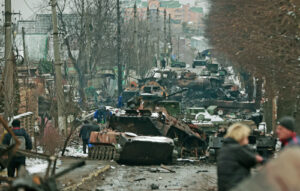
Any NATO expansion is fiercely opposed by Moscow. While Washington has sent arms to NATO allies since Moscow’s war began, the U.S. rulers say they are not looking to expand the alliance.
Shinzo Abe, Japan’s former prime minister, proposed March 1 that the government ask Washington to station nuclear arms in Japan, abandoning its decadeslong ban on such weapons. His call comes amid the Chinese naval expansion in the East.
Alarmed at Beijing’s growing military might, the Australian imperialist rulers, Washington’s main ally in the South Pacific, announced March 10 plans to boost the size of their armed forces by 30%, to nearly 80,000.
Courageous Ukrainian resistance
In the face of Moscow’s invasion — which has yet to take any major Ukrainian city after three weeks of fighting — Ukrainian forces began a counteroffensive in the Kyiv region, as well as near Kharkiv and toward the southern port of Mykolayiv. As a result, “a convoy of occupation forces fled Mykolayiv region,” said Vitaliy Kim, head of the regional administration there. These reports are mostly ignored in the U.S. press, which largely paints Ukrainians as helpless victims.
Several thousand people rallied against the Russian occupation in the southern city of Kherson March 13. As Russian troops fired into the air, protesters shouted “Kherson is Ukraine!” They objected to Moscow’s plan to declare a “Kherson People’s Republic,” along the lines of the statelets in Donetsk and Luhansk that it claims are part of Russia. The regional council of Kherson then voted to reject Moscow’s plan.
In Melitopol, Russian forces abducted the mayor March 11 and then tried to install a pro-Moscow puppet replacement. The next day over 2,000 people demonstrated demanding his return.
To hide the scale of Russians killed in the war, the Kremlin has resorted to reporting figures only at a local, not a national level. And they have left thousands of bodies of dead combatants in Ukraine, rather than risk the effects of large numbers of corpses being sent home. There is a disproportionate number of war dead from rural areas of Russia or from non-Russian peoples. Protests have erupted in the Russian Federation in the north Caucasus.
With the exception of Belarus, all other governments in the Moscow-led Collective Security Treaty Organization — Armenia, Kazakhstan, Krygyzstan and Tajikistan — say they are neutral over Putin’s invasion. Even the rulers in Belarus have refused to provide troops to Moscow’s war.
Naval personnel are being sent by rail from Russia’s Far East to reinforce the invasion. Moscow has also been forced to turn to mercenaries from Serbia, Syria and Chechnya.
Russian opposition to Putin’s war
Despite the heavy crackdown on demonstrations in Russia, anti-war protests were held across 37 cities there March 13. More than 850 people were arrested. The total number detained for opposing Putin’s war is now nearly 15,000.
A woman shouting “Stop the war, no to war!” interrupted an on-air Russian TV news program on the state-controlled Channel 1 March 14. Marina Ovsyannikova, an editor there, held up a placard reading “Don’t believe the propaganda, they are lying to you here.” It was signed “Russians against war.” On Putin’s orders Russian TV news calls the war a “special military operation.”
“We were silent in 2014 when this was just beginning,” Ovsyannikova said afterwards, referring to Moscow’s takeover of Crimea and backing of pro-Russian separatists in eastern Ukraine. Fined and released the next day, she may still face a charge over violation of Russia’s new “false information” law, which carries a sentence of up to 15 years in prison.
